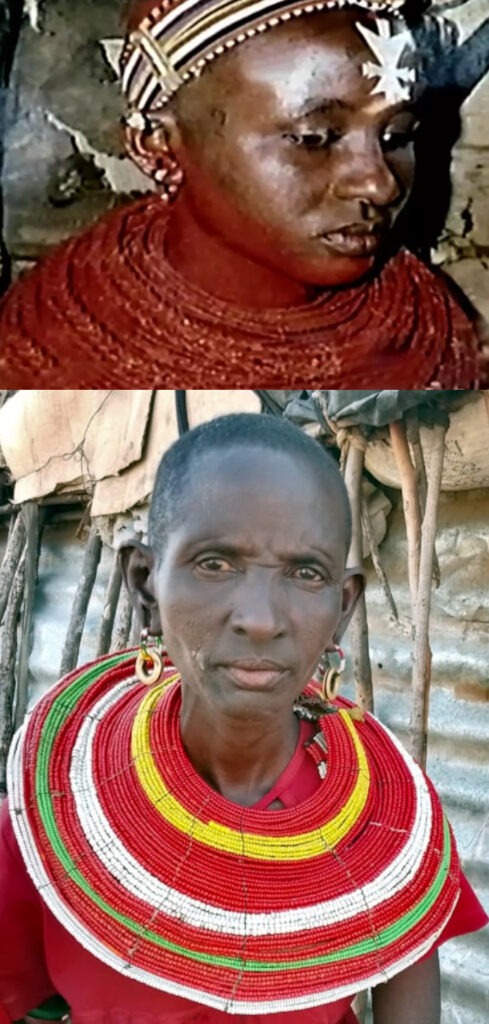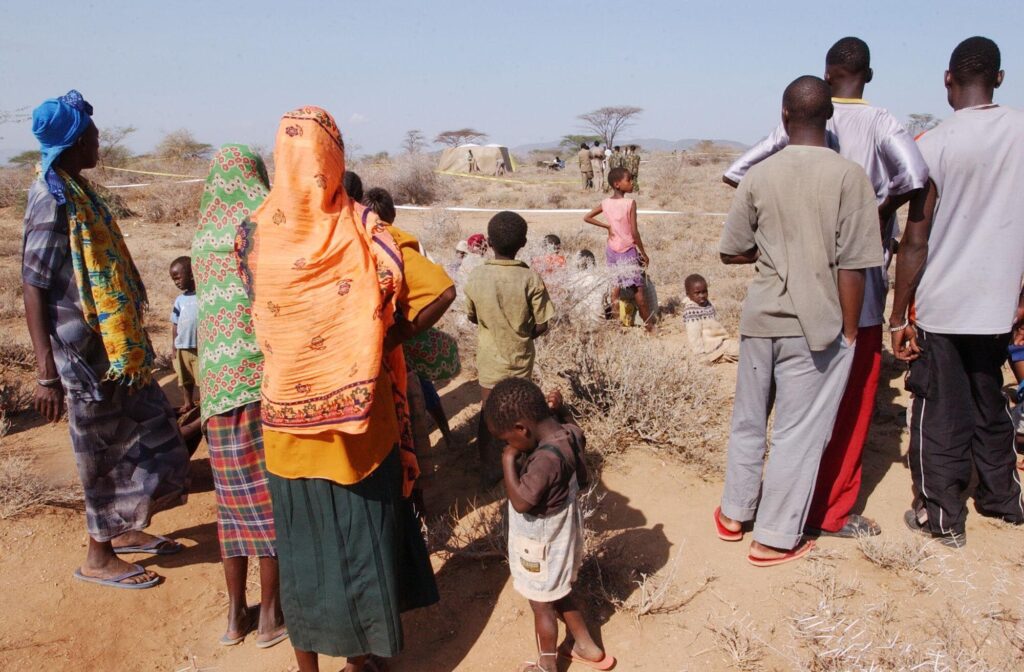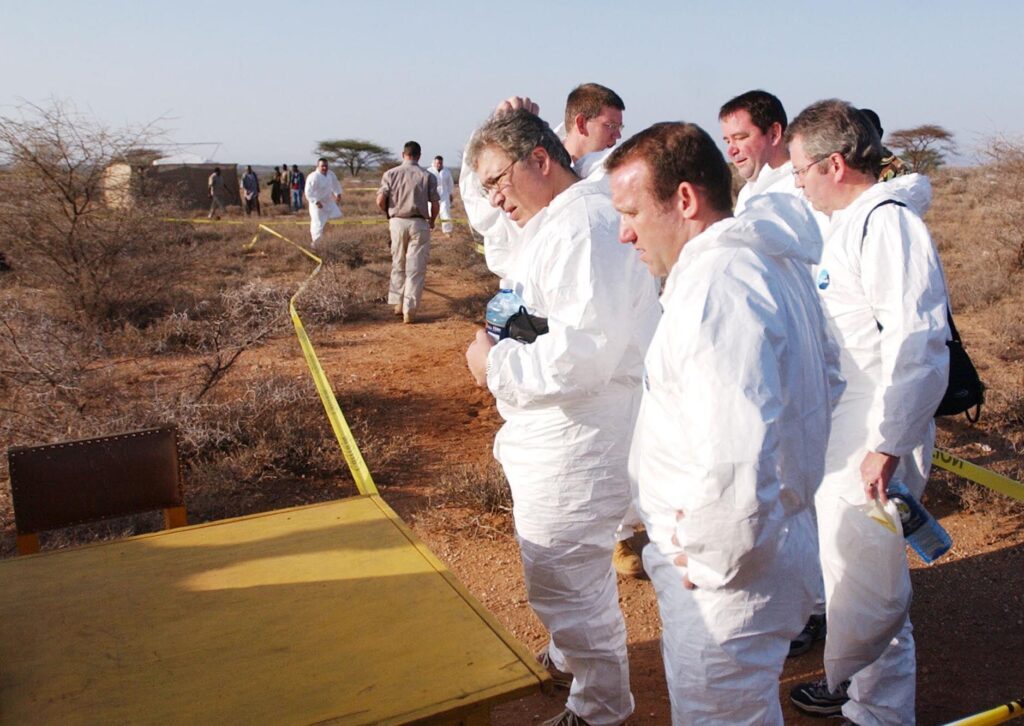Woman allegedly murdered by UK troops suffered 7 broken ribs
A Kenyan teenager allegedly raped and murdered by British soldiers had seven broken ribs when she died, a secret army file reveals.
A battery similar to that used by the UK military was also found in her grave.
The victim, Mantoi Lekoloi Kaunda, was 16 and pregnant when she was killed around 1996-7 in a remote part of Kenya where British troops go for training.
Her body was exhumed in 2004, but the autopsy results were never shared with her family until now.
They are contained in a Royal Military Police report obtained by Declassified UK through freedom of information requests which the Ministry of Defence (MoD) initially refused.
Disclosure was only granted after Mantoi’s sister – Noldonyio Piro, who was allegedly raped in the same attack but survived – supplied a letter in support of Declassified’s request.

Mantoi Lekoloi Kaunda (above) and her sister Noldonyio Piro. (Photos: Supplied)
The report shows that “fractured rib bones were noted” by pathologists examining Mantoi’s body, who found “6 posteriorly on the right side and 1 anteriorly on the left side.”
It added: “Further scrutiny of the ribs revealed no evidence of remodelling of bone that would indicate a healing reaction to fractures occurring during life”.
Importantly, it explained: “Fractures without a healing reaction could occur as a result of acute injury shortly before death.”
Commenting on the document, Piro told an interpreter: “Why didn’t the British army share this report with me 20 years ago, while my father was still alive? What other information haven’t they shown me? I want to meet their investigation team.”
A British army spokesman said: “The UK has fully supported the Kenyan police investigation into the death of Mantoi Lekoloi Kaunda.” He did not comment on Piro’s request for a meeting or further disclosure.
Emma Norton, a solicitor who runs the Centre for Military Justice, told Declassified: “If there is any prospect of further lines of enquiry being pursued in light of this information, I hope the new Defence Serious Crime Unit would be willing to re-open an investigation, if the family wished it.”
Battery
A Royal Military Police captain who wrote the report in October 2004 said the cause of death was “unascertained”.
They noted that the exhumation was happening partly because: “There existed a possibility that evidence from her alleged attacker may have been buried with her.”
The captain added: “It is worthy of note that the Kenya police recovered a number of other items from the scene inclusive of a battery, similar in design to that used by the British army, found approximately 2 feet below the surface of the grave.
“Whilst they appeared to apportion significant relevance to this find it should be noted that the burial of Mantoi was undertaken by her father, some 9.3 kms from the scene of the alleged attack on his daughter; therefore the importance of this find is not shared by the undersigned.”
X-rays of Mantoi’s remains were also taken during the exhumation. In a film made at that time, ITV journalist Fiona Foster said the X-rays “revealed a single long clean break running the entire length of one side of her rib cage.”
Dr Moses Njue, a Kenyan government pathologist, told Foster: “The pattern of the fracture was like a force was applied at the back, a massive force was applied to the rib cage…My guess is it would be things like a boot.”
Few local people could afford such sophisticated shoes in rural Kenya at that time. Detective chief superintendent Gideon Kibunja, who led the Kenyan CID murder inquiry, remarked “The findings so far tend to agree with the claim by Mantoi’s sister that they were attacked by a British soldier”.
He reasoned: “The kind of boots that these officers put on – the kind of boots that are described – there’s a possibility the injuries could have been caused by that kind of boot.”
“We are treating this case as a case of murder, and of course we are also treating it as a case of rape.”

Villagers watch the exhumation of Mantoi Lekoloi Kaunda, 2 October 2004. (Photo: Sayyid Azim / Alamy)
‘He was raping me’
Mantoi’s murder remains unsolved two decades later. Her sister, Noldonyio Piro, told ITV: “I saw two white soldiers in army uniform a long way away…
“One chased me and hit me hard on the back of my head. I fell down and he stood on my arm and it snapped. He was sitting on my back. He was raping me. And then I passed out.”
Mantoi’s alleged rape and murder occurred in Archers Post, a vast area of communal land used by hundreds of British soldiers every year for military exercises.
The family’s allegations only came to light a decade later, as part of a wider scandal that saw UK forces accused of raping hundreds of Maasai and Samburu women.
Britain’s Royal Military Police ultimately concluded many of the claimants had ‘forged’ documents used in their cases and the investigation, codenamed Operation Tasker, was shut down.
The MoD has refused to release more documents to Declassified from Operation Tasker. Kelvin Kubai, a lawyer who represents victims of British army abuses in Kenya, told Declassified there was a “clear pattern” in cases he has seen.
“The victims are never told about the outcome of the military’s internal investigations,” he said. “They aren’t shown these reports and that hinders their access to justice. Procedurally, it would be good practice to share such documents with victims.”

British forensic experts at the burial site. (Photo: Sayyid Azim / Alamy)
‘Unacceptable’
Allegations of British troops committing sexual assault in Kenya resurfaced in 2012 when a local woman, Agnes Wanjiru, was found dead in a hotel septic tank after a night out with soldiers.
Kenyan women also accuse British soldiers of abandoning children they fathered while on tour.
The High Court in London ordered the MoD this year to hand over contact details of 11 British soldiers suspected of fathering mixed race children near an army base in Kenya following DNA tests.
This month the MoD published an internal investigation into allegations British soldiers were paying Kenyan women for sex, following a ban in 2022.
The report claimed such practices continued at a level “somewhere between low and moderate” and were “not out of control”.
They found 35 suspected cases since July 2022, an increase in the 24 cases first reported by Declassified last year.
Emma Norton, from the Centre for Military Justice, commented: ““There have long been serious concerns about the conduct of British soldiers overseas and although important steps have been taken to address some of these behaviours in recent years, we continue to receive reports of completely unacceptable behaviours and attitudes towards local people in East Africa on the part of some of our troops.
“Recent evidence that some soldiers are still using prostituted women also suggests there is still a long way to go and a gulf between the Army’s ‘values and standards’ and the reality on the ground.”